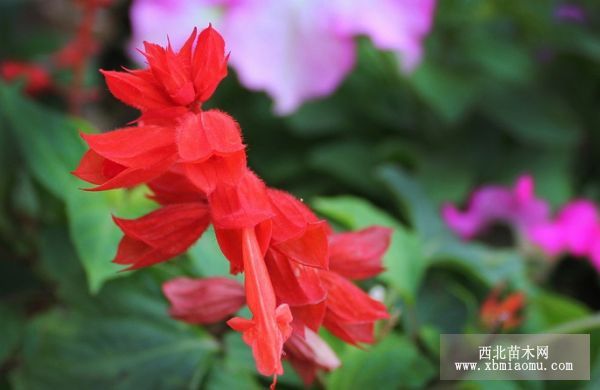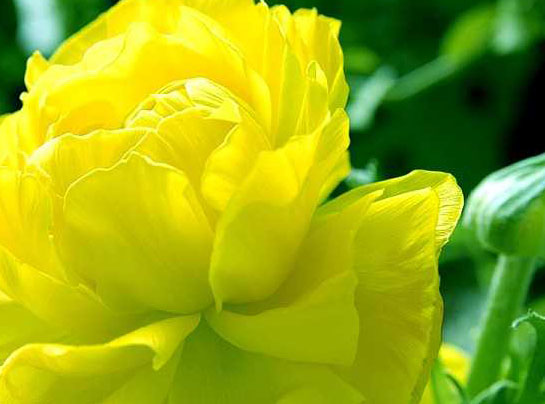What should you pay attention to when potted with a string of red?
Pot-string red, pot soil can be made of 4 parts of garden soil, 4 parts of rotten leaf soil and 2 parts of river sand. Apply a small amount of cake fertilizer to the bottom of the basin as base fertilizer, which is usually watered "dry and wet" to facilitate root growth. Don't water too much in the early stage of growth. If too much watering, the leaves are easy to turn yellow and fall off, affecting flowering.
In the vigorous growth period, thin cake fertilizer was applied every two weeks to promote the plant to grow luxuriantly and blossom well. One-time compound fertilizer should be applied during the bud period and after the flower shedding to make the flowers bright and lay a good foundation for the next flowering. In the process of growth, it is necessary to pick hearts and buds for 3 and 5 times to promote more lateral branches until they stop picking hearts and buds about 25 days before the scheduled flowering date, then they can be in full bloom.
After several times of heart-picking plants, the plant shape is short and strong, with dense branches and many flowers. It is feasible to re-cut after flowering, so that the long branches can be cut off. Strengthen the management of fertilizer and water after cutting, and it can blossom again later.

A string of red native to South America, sexual preference for warm, humid and sunny environmental conditions. Although it can tolerate semi-overcast, the cultivation and ornamental effect is not the best. Avoid extreme heat and cold, the suitable growth temperature is from 20 ℃ to 25 ℃, stop growing below 15 ℃, and the leaves turn yellow and wither below 10 ℃. It is not strict with the soil. The best potted soil is sandy soil which is rich in humus, loose and fertile, and highly permeable. There are usually two kinds of red flowers cultivated in different places: big red and small red. The big string red plant is 50 cm to 90 cm high, the flower ear is long, scarlet, more heat-resistant. Small clusters of red plants are 20 cm to 30 cm high, with tight spikes and bright red flowers. The heat resistance is poor. From July to August, the leaves are often yellowed and grow slowly. With the decrease of natural temperature, they gradually become strong and grow normally. Poinsettia is mainly sown and cultured, and the plant is well-proportioned and plump, fresh and neat. A string of red in a large potted plant on National Day should be soaked and sowed in the greenhouse in early spring and February. When the seedlings grow to 4 pairs of leaves, the root clump is planted in the second tube pot for maintenance. When the seedling is 15 cm high, it is coring to promote branching. After that, whenever there are 4 pairs of leaves in the branch, pick the heart at any time, grow and pick again, and gradually expand the crown of the plant. At the same time, pay attention to observe the bottom of the basin, a white root is exposed, and the whole block is knocked out in time to put on a larger planting basin, so that the roots are not wrapped in Tuo rolling blankets and continue to flourish and stretch. The plant grows and expands with it. The planting basin is changed to a bucket basin with an inner diameter of 50 cm. The National Day flowering plant height and crown width can reach more than 1 meter, and the flower spike can reach 400 to 500. The display of tall buildings in front of the momentum is spectacular. General National Day layout of flower beds, flower border with a large number of flowers, can be sown in April to May big string red or small string red, into a seedling on the two cylinder basin, plant height of 10 cm, up to 20 to 30 branches, lively and fresh plant posture. Depending on the growth of the plant, the heart will be picked for the last time from September 1 to 5, the weak ones will be picked first, and the strong ones will be able to blossom as scheduled. Plant growth period should always keep the basin soil and the surrounding environment moist, not long-term drought or stagnant water for a long time. Add the right amount of base fertilizer to the basin. Qiuliang began to apply dilute organic liquid fertilizer every ten days, or alternately with a mixture of 0.2% urea and 0.1% potassium dihydrogen phosphate. Using a string of red on May Day, it is appropriate to avoid the rainstorm and sow small string of red in the open field after the middle of August. In early October, the seedlings were planted in the greenhouse, pay attention to ventilation and water control to prevent overgrowth. At the beginning of December, the plant was planted in the upper two-cylinder basin, and the heart was removed at the right time, keeping the room temperature from 20 ℃ to 25 ℃, with sufficient light, fresh air and moderate water and fertilizer. Finally pick the heart in early April, gradually increase ventilation, reduce the difference between indoor and outdoor microclimate, should be placed in the open air, flowers and leaves green, fresh and healthy. Can I plant a bunch of red? Cultivation and management skills of a bunch of red potted plants
When a bunch of red flowers bloom, the spike is unique, which is very suitable for planting in gardens and roadsides, and its biggest feature is that it can sow and reproduce on its own, so it is very suitable for potted flowers. Parents who like flowers and plants can learn a series of red pot cultivation and management skills.
A bunch of scarlet red flowers, green leaves, suitable temperature can blossom year-round, often used for flower bed layout or pot ornamental. The cultivation and management techniques of potted saffron are as follows:
I. Variety selection
Potted red should choose varieties with compact plant type, low plant type, thick green leaves, bright red flowers and long flowering period, such as Prospect, Helios and so on.
2. Preparation of basin soil
A string of red like wet fear of waterlogging and drought resistance, basin soil should be loose and fertile drainage good humus-rich micro-acid soil, can be mixed with rotten mushroom waste, peat soil, mature pig manure at 4:4:2, mixed with 1% carbendazim and 1% furan granules to kill diseases and insect pests in the culture soil.
Third, temperature and light management
The author raised a string of red outside in Beijing. Before 2005, a string of red leaves was particularly green, and after 2006, a string of red leaves became more and more yellow every year, because after 2006, the air quality in Beijing was good, and the light was particularly strong. Outdoor leaves without shade will turn yellow, even if the prospect and Helios varieties are not good. The suitable temperature for growth is 20-25 °C, and the lowest temperature is not less than 15 °C.
IV. Water and fertilizer management
A string of red like dampness, afraid of waterlogging, like fertilizer, pot topdressing diammonium phosphate is the best, clean and hygienic, convenient fertilization, directly along the edge of the basin, 8-10 tablets each time, once every 10-15 days. After application, the leaves were thick green and thick, and 0.3% potassium dihydrogen phosphate was sprayed at the bud stage of flower bud differentiation, and the flower color was more colorful.
5. Florescence control
From planting to flowering, a string of red flowers usually goes through 2-3 heart-picking, plump plant type, and can blossom 25 days after the last heart-picking, and the florescence control of a string of red is mainly controlled by heart-picking.
VI. Pest control
A series of red continuous overcast days occurred downy mildew blight, root rot and death, can be used to control downy mildew bengjing; high temperature exposure is easy to infection virus disease, control measures include killing aphids, using omethoate or aphid lice to control; shading or sparse woodland cultivation.
A string of red planting method is simple, and easy to survive, as long as the selection of varieties, pot soil preparation and other related pot cultivation management skills on it.
- Prev

How to maintain buttercup
The flower hair is named Persian buttercup. The flower is solitary at the top of the branch or produces a long pedicel from the axils of the leaves. Corolla rounded. There are white, yellow, orange, red, purple, brown and other colors. The florescence is from April to May. It is more hardy, but not resistant to heat, and goes dormant in summer in most parts of China. Afraid of strong light exposure, grow well in sparse shade
- Next

Methods and key points of hydroponic culture of green pineapple
Flower hydroponics steps: 1. Select utensils. According to the specific conditions of the variety, shape, specification and color of the plant materials you want to carry out flower hydroponics, choose the substitute bottles, pots, vats, and other utensils that can complement each other and complement each other, in accordance with the principles for the selection of hydroponic appliances mentioned above.
Related
- Fuxing push coffee new agricultural production and marketing class: lack of small-scale processing plants
- Jujube rice field leisure farm deep ploughing Yilan for five years to create a space for organic food and play
- Nongyu Farm-A trial of organic papaya for brave women with advanced technology
- Four points for attention in the prevention and control of diseases and insect pests of edible fungi
- How to add nutrient solution to Edible Fungi
- Is there any good way to control edible fungus mites?
- Open Inoculation Technology of Edible Fungi
- Is there any clever way to use fertilizer for edible fungus in winter?
- What agents are used to kill the pathogens of edible fungi in the mushroom shed?
- Rapid drying of Edible Fungi

